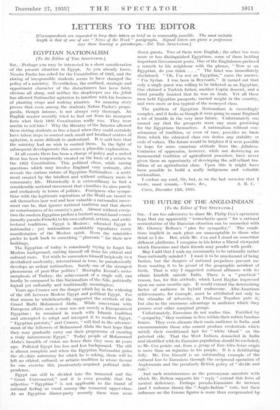LETTERS TO THE EDITOR
[Correspondents are requested to keep. their- letters..as brief as is reasonably possible. The most suitable length is that of one of our ." News of the Week" paragraphs. Signed letters, are given a preference over those .bearing a pseudonym.—Ed. THE SPECTATOR.]
EGYPTIAN NATIONALISM
[To the editor of Tax SPECTATOR.] SIR,—Perhaps you may be interested in a short consideration of the present situation in Egypt, As you already know, Nessim Paeha has asked for the Constitution of 1923, and the rioting of irresponsible students seems to have changed the policy of a ministry. Nevertheless, the confined, strategic and opportunist .character of the disturbances has been fairly obvious all along, and neither the shopkeeper nor the fellah has allowed Nationalist agitation to interfere with his business of planting crops and making piastres. An amusing story proves that even among the students Nahas Paeha's propa- ganda, though intense, is not always very thorough. An English master recently tried to find out from his insurgent form what their 1923 Constitution really was. They were unable to tell him Why the Ministry of the Interior allowed these rioting students so free a hand when they could' ceri ainly have taken steps to control such small and localised centres of agitation, is more difficult to understand. It is said here that the ministry had no wish to control them. In the light of subsequent developments this seems a plausible explanation.
At all events there has been a change of policy and a united front has been temporarily created on the basis of a return to the 1923 Constitution. This political chess, while raising questions which may involve England very seriously, also reveals the curious nature of Egyptian Nationalism--a senti- ment created by the intellect and without ordinary roots in community life. Historically it is extraordinary to find a considerable national movement that visualises its aims purely and exclusively in terms of politics. Foreigners who sympa- thise with the legitimate aspirations of the Wad are bound to ask themselves how real and how valuable a nationalist move- ment can be, that ignores national tradition and that shows no consciousness of it country's past. .Almost without excep- tion the modern Egyptian prefers a bastard second-hand veneer (usually pseudo-French) to his own cultural, artistic, and archi- tectural traditions. Egypt is Moslem ; educated Egypt is nationalist : yet nationalism snobbishly repudiates every manifestation of the Moslem spirit. Even the ministries prefer to hark back to something " pharonie " for their new buildings. The Egyptian of today is consciously trying to forget his Moslem background, cutting himself off from his ethical and cultural roots. Yet while he surrenders himself helplessly to a deVitilised modernity, international in tone, he paradoxically develops an ardent nationalism. Surely one of the strangest phenomena of post-War politics I Mustapha Keinal's meta- morphosis of Turkey, the achievement of a single will, can hardly be compared to this Nationalism of the Nile, politically logical yet culturally and traditionally meaningless. Years ago Cromer saw the danger which lay in the widening of the rift between Moslem Egypt and political Egypt. For that reason he -wholeheartedly supported the attitude of the Grand Mufti Mohammed Abdti. While converSant with European affairs such a man was not merely a Europeanised Egyptian ; he remained in touch with Islamic tradition and attempted to adapt and interpret it to modern Egypt. " Egyptian patriots," said Cromer, " will find in the advance- ment of the followers of Mohammed Abdu the best hope that they • may gradually carry out their programme of creating a truly autonomous Egypt." Today people of Mohammed Abdu's breadth of vision arc fewer than they were 40 years ago. Political Egypt has less and less background. The rift' is almost complete and when the Egyptian Nationalist gains the abLolute autonomy for which he is asking, there will be left no ethical, cultural, or artistic tradition in whose favour he can exercise' this passionately-acquired political inde- pendence.
Egypt can still be divided into the trousered and the "Great Untrousered," and it is even possible that the adjective " Egyptian" is not applicable to the brand of national feeling so vocal among the trousered upper-class.. At an Egyptian dinner-party recently there were some dozen guests. Two of them were English ; the other ten were more or less distinguished Egyptians, some of them holding important Government Posts. One Of the Englishmen prefaced a remark to his neighbour with the phrase, "Now as an Egyptian, do you think . . . " The label was immediately disclaimed. "Oh, I'm not an Egyptian," came the answer.
" Syrian. I was horn in Bcyrouth." It turned out that only a single guest was willing to be ticketed as an Egyptian., One claimed a Turkish father; another Coptic descent, and a third proudly insisted that he was an Arab. Yet all these men held -Egyptian passports, • carried weight in the country, and were more or less typical of the moneyed class. • "
The problem of Egyptian Nationalism is exceedingly complex, and it looks as though it were going to cause England a lot of trouble in the very near future. Unfortunately one cannot say that the prospects seem any more promising for the Egyptians themselves. A nationalism without con- sciousness of tradition, or even of race, provides no basis from which the educated class can derive any stability or code of values. The future would be brighter if it were possible to hope for some conscious attitude from the fellaheen. Centuries of oppression, however, while not destroying an immemorial tradition of agricultural procedure, have never given them an opportunity of developing the self-reliant tra- dition of an agriculturist class. Upon this it might have been possible to build a really indigenous and valuable nationalism. • I enclose my card, Sir, but, as on the last occasion that I wrote, must remain,—Yours, A. B. C. Cairo, December 13th, 1935.


































 Previous page
Previous page